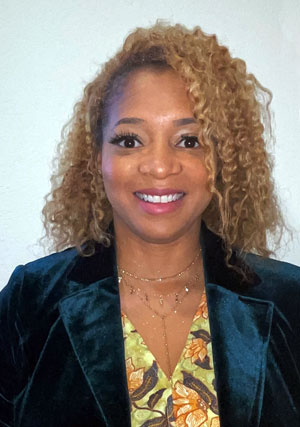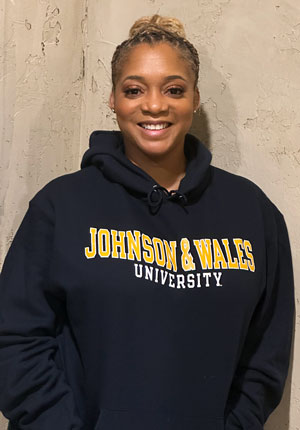Human Resources Director at a Financial Investment Firm in Westlake, Texas
New jobs can be challenging. Even highly experienced and accomplished individuals may doubt themselves when taking on a role that’s a step up from positions they have held in the past. Rasheeda Brooks Johnson shares her journey as she transitions to a Human Resources Director role and tells us how earning an online Masters in Human Resource Management degree through JWU Online helped her meet new challenges to achieve success.
I hit my ceiling at my job and began exploring different companies.
I had twenty years of experience at multiple financial services companies, and was working as a project manager, handling talent and performance cadence to support the executive leadership team. I had some good successors to take over my role, so I felt that I could move on. Focusing in on my transferable skills, I identified what I really enjoy doing — helping people.

Within hours of posting on my LinkedIn profile, ‘Hi everyone! I am looking for a new role and would appreciate your support,’ one of my former managers reached out to me. She asked, “Are you really looking for another job?” She directed me to open positions at the financial investment organization where she worked.
I appreciate that the organization has a family-oriented culture. The company wants its employees to get their work done, but also to enjoy a family and personal life — that’s a good blend for me.
I applied for several positions within the organization, so when they offered me the Director of Human Resources position, I was surprised at their choice. My first thought was, ‘What, me? Why did the company think I was a match for the Human Resources Director position? I can never do that!’
I had never held a position in human resources. I felt like an imposter.
As I came on board, I realized that my entire peer group of business partners had started their careers in an HR rotation program or as an HR generalist with this company. I was the first person within my peer group whose title in her previous job had been “project manager” and whose twenty years of experience had been accrued outside of this financial investment organization. I had the skills but was nervous because I had never had a human resources title. I let my emotions get the best of me.
After I was hired, I asked my manager why she had chosen me for the Director of Human Resources role. She said she intuited that I would be a good fit. My ability to look at a situation and assess it holistically — without really taking sides — showed her that I am able to have an open perspective, but also align to the company’s standards and guidelines. Her reassurance bolstered my confidence.
My self-doubts surfaced again briefly when I met with the company’s leadership.
Face to face with the leadership team, I was keenly aware that no one in the room looked anything like me. As their new partner, I was expected to support this leadership, a highly tenured group of men who had been with the organization for 25–30 years. The lack of representation across ethnicity and gender within the leadership group gave me pause.
I knew that the organization had been actively working toward a diverse and inclusive company culture. I’ve learned in twenty years of business that collaboration among people with different backgrounds and perspectives yields creative solutions. My experience and proven capabilities would give me the ability to contribute innovative solutions to deepen the organization’s support of a diverse workforce and foster an inclusive experience within my leadership group.
Back to School
As I began my role as the new Human Resources Director, I sat back in the meetings, observing and listening to the leaders’ language. ‘What is their vocabulary? How are they operating?’ I would also sit with associates at all different grade levels within the company. I wanted to know the business inside and out, so that when I came to the table, I would understand the business strategies and be able to create value for the leadership team. I thought it might be the right time to go back to school to get a human resources master’s degree.
Most of the leaders in my organization, who are vice presidents and above, have earned a master’s degree. When I read the description of the HR program at JWU, there were courses that focused on Strategic Compensation and Recruiting—these were two areas in which I wanted to grow. In addition, when I feel ready to move up within the organization, I don’t want the lack of a master’s degree to limit me as a viable candidate for a Vice President’s role.
Several professional peers spoke highly of the online master’s programs in Human Resource Management offered through Johnson & Wales. I reviewed the core and elective courses offered and knew this program was right for me. The program descriptions touched on several facets of HR such as Compensation, Onboarding, Leading in Change and Understanding Changes in Business Strategies. The skills learned at JWU would help me align my education to future career aspirations.
When I reached out to my new manager and a previous manager to get letters of recommendation, they agreed that the program would be awesome for me. I appreciated that through the partnership my organization has with Guild Education, my education would be fully funded. My Guild counselor was extremely helpful in answering my many questions, helping me navigate the choices of school programs and guiding me through the steps to apply and be accepted at JWU.
Learning Online
I had to adjust to learning online. The learning curve to become proficient in accessing tutoring services and resources like the library was a bit daunting, as I wondered, ‘Where do I go? When is it available? What buttons do I click on?’ Clicking through all of the different links for course materials and resources challenged me until I became comfortable about where and how I could access the information I needed.
Resources are typically listed in each course’s syllabus; however, it helps to be proactive in exploring what is available and where to find it. There may be moments when, for example, I don’t understand how to do a specific calculation. Knowing that training is available online, and that the library has assistants to help me use the library links to pool resources, continues to be helpful for me.
Friendly Staff and Faculty
JWU Online has been welcoming from the day I was accepted into the program.
In my experience, there are no walls between admissions representatives, student advisors, financial planners and teachers—everyone works together to provide a warm and friendly atmosphere.
My Student Advisor, Tom Strawn, has been a major help to me.
Whenever I send him an email, or I reach out via phone, he contacts me right away. He is open in letting me know how my scheduling of classes should look, which is important to me.
Initially, when I met with Tom, I told him that I wanted the quickest track possible to complete the program, but Tom was realistic. He informed me that you need 10 to 15 hours a week per class to really dedicate yourself fully to the course. If I ask him to enroll me in more than two classes at a time, he lets me know the time commitment can be extremely demanding.
Tom has been open to providing feedback. If I hit a roadblock, he has been here to answer my questions, so that has been awesome. Just giving me tips and information about how to succeed at JWU has been exceptionally helpful.
I have reached out to each of my teachers to say, ‘thank you’ and include why I enjoyed the class.
I recommend students do that to build relationships. I can go back to teachers with whom I have taken classes to ask questions. Some of them will become teachers for me again; one professor has already taught two of the classes I’ve taken.
I appreciated the honesty of one professor in providing feedback about my delivery of assignments and the content that I included. Sometimes teachers just say that you did “really well” and then they move on. Even though I had a good grade on that assignment, the professor took time to describe what made it a good grade.
I have flourished in a learning environment in which my teachers are intentional in their feedback about what I did well in an assignment and where there are opportunities to improve. My teachers’ willingness to provide detailed feedback has helped me increase my confidence as I work through the human resources program.
The relationships I am building with faculty in my program reinforces my sense of community. At JWU, the message I get from everyone is, “You are not alone in this journey — we are here to help.”
Embracing Chaos
I work full-time in a hybrid position, while also taking the online courses in the master’s program.
My husband works nights, which makes balancing our school, work and family life more challenging. We also have three sons. One is 16, so he can see mommy’s work ethic and school ethic — and how he can apply those for himself later in life. Our other sons are seven and three years old.

So, I deal with every possible emotion, every minute of the day — which, while chaotic, actually helps me know how to deal with my leaders at work. When you think about leaders in corporate America, no one of them responds the same way. Leaders all have different expectations, diverse needs, different communication styles. Raising my boys has taught me to pivot more quickly in how I interact with my staff. I actually like the chaos — I chose to set my life up this way!
At times during the program, I’ve asked myself, ‘How am I going to do all this? How will I maintain all of my responsibilities and accomplish all of my goals?’ When I feel overwhelmed, I lean into that desire to get a better education. My eagerness to accomplish my goal of earning a master’s degree motivates me to stay on track.
Location makes a difference.
Working remotely from my home office, I set up a designated location for work with a different desk for school. I needed to divide the two, so I could say, ‘This is for work. This is for school.’ That has helped me focus on each one individually. It’s a mental switch for me, but it has also served as a mental switch for my family.
Working at home, my family has been able to interrupt me during my work time. Changing locations became a visual cue for my family to say, ’Hey, mommy is dedicating this hour-and-a-half to studying, so maybe I can’t interrupt her unless it’s an emergency.’ But also, for me, it mentally provides a different kind of stimulation, because I am in a different room. So, it has given me a different energy to say, ‘This is something I’m doing for myself. I am dedicating this time to school and work can wait.’
Education Solidifies Business Experience
I have been consolidating what I know from past work experience with what I’m learning in the human resources program. The program has impressed upon me the importance of workforce capacity planning and understanding the organization’s talent. I’ve learned that you always need to know where your resources are and where there’s gaps and opportunities to ‘plug’ people into those spaces. Understanding the talent in your group is essential; you want to be aware of what goals they have and what work they want to do.
One of my goals at work is to make sure we have sufficient resources in the right place at the right times. When focused on capacity planning, as a human resources professional, you can know the overall head count within the organization, but not necessarily understand or know each individual’s talents.
As I gain new perspective from my studies at JWU, it makes sense from a human resources point of view to consider that our talent is our most valuable resource; it helps to have the organization remember that as we go through the day-to-day. We’re going through changes, we’re going through reorganization; but at the same time, there is a human dimension. As we think about moving talent around, we want to be aware that our talent has to have a voice — they need to have a say in how they want to shape their career.
People are also going to go through different emotions when there’s change within the organization. We have to recognize that there are levels or phases of acceptance of change. As an individual, maybe I can accept change really quickly, but the person right next to me may not be able to. And that’s okay. Just helping someone understand their value as a person, and in the work that they support, is important as these changes occur.
Thinking about how best to use the organization’s collective talent takes a specific skill set. At school I have been encouraged to be both strategic and a business leader. You have to ask yourself, ‘Are our talent capable of doing this? Do they even want to do this?’ Working with our talent partners, I have had regular conversations with my executive lead to understand: ‘First, are you having conversations with your associates to understand their aspirations? And second, is there someone who could take over your role today and what skills would they need to be successful?’
When you ask those two questions together, that sort of forces the leader I am mentoring to take a step back and say, “Am I developing my team the way I need to, so that I support the future state of the organization? And then, who are the successors that are available to take my place, if I moved out of my position today?”
For example, if I, in my role as HR director, were to take two people out of a 20-count team, and say to them, ‘We want to consider moving you to the next level.’ I should have been working all along with that thought process in mind, so I could easily pivot and support the change in business strategy.
Suggestions for Current and Future Students
My work has centered on people, from helping talent improve their performance to guiding and motivating leaders in a large corporation to help them manage and inspire their teams — and also raising three boys! In offering advice to current and future JWU Online students, I am a student like you, so my suggestions come from my own experience.
- Be eager to accomplish your goals. Lean back on that eagerness every day to succeed in the program you’ve chosen.
- Be open with others and let them know that this is your journey and the goal you’re trying to accomplish. This will help you have both moral and physical support from people around you.
- After you are accepted into the program, sit back, digest the syllabi, get to know your teachers and ask questions. Don’t hold back on asking your questions, because right at the beginning, asking questions will set you up for future success. Reach out to ask your questions directly.
- Set up a schedule and a designated location to study. Make efforts to understand the deadlines and be intentional that you’re going to meet those deadlines. If you know you need to study two hours each day to accrue the eight hours over the whole week to finish an assignment, dedicate that time and remind yourself, ‘This is for my personal growth. This is for my education.’
Creating Community Online
Most students want to feel a part of the school culture—we want to feel that we are not alone on an island. Even as an online student, you can be — and help others be — a part of the JWU community and culture. I began by making connections when I had group assignments. Whether reaching out to individuals while in group assignments together, or with others outside of those groups, I would say, ‘Hey, we’re in the class together. If you get stuck, or if I get stuck, we can be available to each other.’
It helps to set up times to talk, whether it be via chat, or on Zoom, or by email. Once I made those intentional connections with a few individuals, we regularly texted each other, for example, to wish each other happy holidays. We’ll often ask one another, ‘How are you and your family?’
At JWU, by reaching out, you will gain the support of other students and staff and professors. I suggest if you are a student, make intentional connections with others as early as possible. The connections you make will follow you throughout the duration of your program and even after graduation, as you build your professional network.
Recognizing My Value
Questioning my ability to become a Human Resources Director was just nerves.
Once I switched my internal feelings as I got into my role, my proven capabilities in People Operations, Conflict and Change Management allowed me to shine. My experience in Talent and knowledge of KPIs to gauge performance have helped me easily devise solutions. Recognizing all that I bring to my role as Human Resources Director — and with new knowledge and understanding from my studies at school — I have been able to relate well to the leadership within my organization.

Transitioning into my new role, I have focused on what I knew I was able to do well. My project management experience, Agile understanding and analytical skills have given me an advantage in my peer group that has resulted in leaders asking me to mentor other external candidate who recently joined the organization.
Graduating With the Master’s Degree
The Master of Science in Human Resources degree program has filled in gaps for me, especially related to Strategic Compensation. What I’ve learned in the program is valuable to my decision-making and workforce capacity planning. Human Resources solutions at my organization are not a one-size-fits-all solution. Having the class as a refresher, point of reference, or even to be able to bounce around ideas with other classmates has supported me in my new role.
Before I entered the program, I felt like I was making decisions without understanding the legalities and standards. After I enrolled, things just sort of clicked; I can relate what I am doing on the job back to what I’m learning in school. I’m solidifying my roles and responsibilities at the financial institution with my new educational background. Education has given me more confidence — I now understand why I’m a good fit for the Director of Human Resource role.
With only two courses left to complete, I expect to graduate during Fall 2024. After graduating, I’ll figure out what I want my next new and wonderful adventure to be — maybe in the future I’ll go on to earn my DBA degree. Balancing school, work and family has often made life chaotic, but it has also been fun!
I am pleased that I chose to earn the Human Resources Management master’s degree through JWU Online.
The university supports your journey towards educational growth by providing knowledgeable teachers who are experts in their respective fields. Whether new to your preferred profession, or experienced in the industry, the professors will help you polish your experiences, skills and knowledge so you can achieve real-world success — and become the best version of YOU. I recommend investing in an education at JWU Online because the school cares about their students’ success — and everyone at JWU cares about you!
